In a fast-paced world where the first meal of the day is often neglected or rushed, cultivating a healthy breakfast routine can be transformative. Beyond simply fueling your morning, the choices you make at breakfast have profound implications for weight management, metabolic health, and cognitive performance throughout the day. Particularly for individuals with demanding schedules, adopting sustainable, science-backed breakfast meal prep habits is not just a matter of convenience—it is a commitment to long-term well-being. This article explores healthy breakfast meal prep ideas that support weight loss, unpacking the scientific rationale behind them while offering practical guidance designed for real-world application.
You may also like: Smart Meal Prep for Weight Loss: Expert-Approved Lunch Ideas and Recipes to Stay on Track
A well-prepared breakfast lays the foundation for mindful eating and balanced nutrition. When strategically designed, breakfast can enhance satiety, regulate blood sugar levels, and minimize cravings later in the day. Many studies confirm that individuals who consistently eat a nutritious breakfast are more likely to maintain a healthy weight and experience improved energy levels. This article delves into evidence-based insights while highlighting how thoughtful meal prep can seamlessly align with even the busiest lifestyles. Whether you follow a plant-based diet, a flexitarian approach, or are exploring new routines, these breakfast meal prep ideas for weight loss will help you prioritize health without sacrificing time or flavor.
The Science of Satiety: Why Breakfast Matters for Weight Management
Scientific literature increasingly underscores the connection between breakfast consumption and effective weight management. When it comes to curbing hunger and avoiding mindless snacking, the timing and composition of your first meal play crucial roles. A breakfast rich in protein, fiber, and complex carbohydrates not only supports satiety but also helps regulate appetite-related hormones such as ghrelin and leptin. This hormonal balance can reduce the likelihood of overeating later in the day, a common barrier to sustained weight loss.
Researchers from the American Journal of Clinical Nutrition have noted that individuals who consume high-protein breakfasts experience reduced activation in brain regions associated with food cravings. Similarly, incorporating soluble fiber—found in oats, chia seeds, and fruits—can slow digestion and stabilize glucose levels. These findings align with broader evidence suggesting that regular breakfast intake is associated with healthier body mass index (BMI) ranges and improved metabolic outcomes.
Healthy breakfast meal prep ideas grounded in science often emphasize volume-rich foods that provide fewer calories per gram, such as leafy greens, berries, and whole grains. This approach is consistent with the principle of energy density, which suggests that people tend to consume the same volume of food regardless of caloric content. As a result, incorporating high-volume, nutrient-dense ingredients is an effective strategy for weight-conscious eaters.
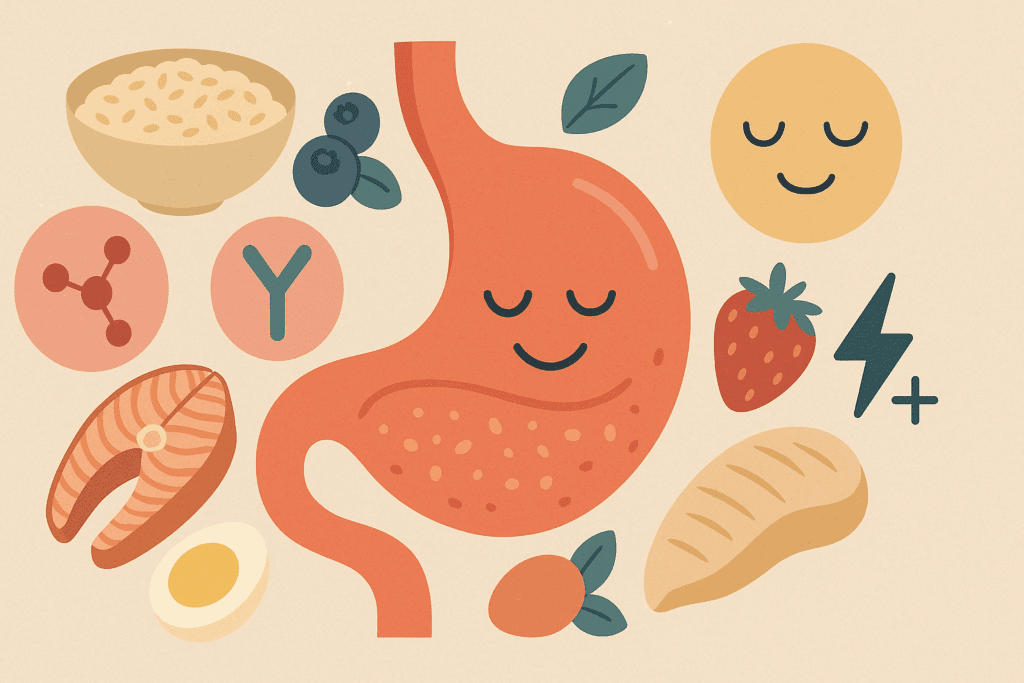
Understanding Macronutrients: Building Balanced Breakfasts for Sustained Energy
An effective breakfast begins with a careful balance of macronutrients. Proteins, carbohydrates, and fats each play a unique role in creating satisfying, metabolism-boosting meals. Protein is particularly important for breakfast because it stimulates muscle protein synthesis, reduces hunger hormones, and contributes to thermogenesis—a process where the body burns calories to digest food.
Carbohydrates provide the primary source of energy for the brain and body. However, the type of carbohydrate is crucial. Refined carbs, like white bread and pastries, can lead to energy crashes and increased hunger shortly after consumption. In contrast, complex carbohydrates such as steel-cut oats, quinoa, and sweet potatoes provide slow-releasing energy that enhances focus and endurance throughout the morning.
Healthy fats, often underappreciated, are vital for hormone production, brain health, and nutrient absorption. Avocados, nuts, seeds, and plant-based yogurts provide these benefits without contributing to excessive caloric intake when portioned appropriately. Meal prep allows for better control of fat sources, ensuring meals remain both satisfying and nutritionally appropriate.
Incorporating all three macronutrients in proper balance promotes glycemic control and minimizes the risk of reactive hypoglycemia—a common pitfall for those consuming high-sugar breakfasts. The strategic integration of protein, fiber-rich carbs, and heart-healthy fats in breakfast meal prep ideas for weight loss is essential for long-term dietary adherence and metabolic balance.
Smart Strategies for Breakfast Meal Prep Success
The key to successful breakfast meal prep lies in consistency, simplicity, and variety. When meal prepping for weight loss, the goal is to reduce decision fatigue and create an environment where healthy choices are the default. Start by selecting a few go-to recipes that are easy to batch-cook and store. Overnight oats, chia pudding, smoothie packs, tofu scrambles, and baked oatmeal are all nutrient-rich options that can be prepared days in advance.
Storage methods also play a crucial role. Investing in freezer-safe meal prep containers can help extend the shelf life of prepared meals and reduce food waste. Glass containers with portion dividers are ideal for separating ingredients like fresh fruit and granola until you’re ready to eat. Labeling meals with preparation dates can streamline morning routines and ensure safe consumption.
Batch cooking breakfast components—such as baking a tray of tofu with vegetables or preparing a large batch of buckwheat pancakes—enables quick assembly during the week. Similarly, pre-chopping ingredients like bell peppers, spinach, or mushrooms can shave minutes off morning prep time. Consider rotating ingredients weekly to maintain variety and prevent taste fatigue, which is a common obstacle to sustained dietary compliance.
For individuals following a low-carb or plant-based diet, customizing your meal prep to meet these needs is entirely feasible. Options like almond flour muffins, coconut yogurt parfaits, or flaxseed protein balls provide portable, satisfying, and nutritionally dense alternatives to traditional breakfast fare.
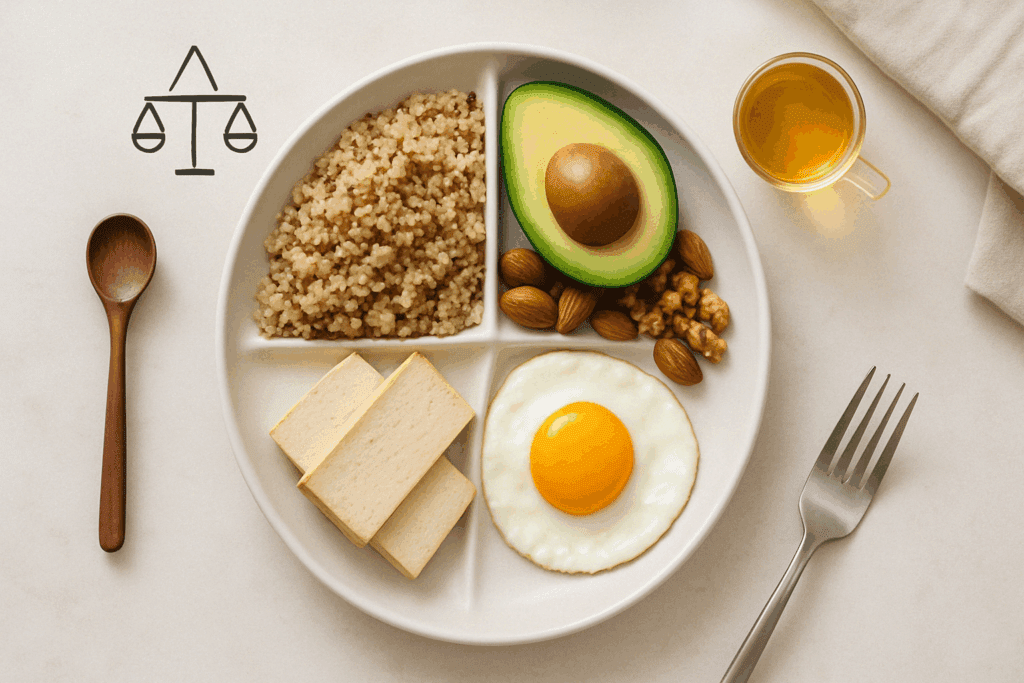
Is Keto a Low Carb Diet? Understanding the Differences and Overlaps
Amid discussions of weight loss and nutrition, many individuals wonder: is keto a low carb diet, and how do they differ? While both approaches emphasize carbohydrate restriction, the ketogenic diet vs low carb diets differ significantly in intent, macronutrient composition, and metabolic effects. Understanding these differences is essential when selecting a dietary strategy that aligns with your health goals and lifestyle preferences.
A ketogenic diet, or keto diet, typically limits carbohydrate intake to under 50 grams per day, with a greater emphasis on high fat intake—often up to 70-80% of total calories. This macronutrient balance shifts the body into a state of ketosis, where fat becomes the primary fuel source instead of glucose. By contrast, low-carb diets allow for a broader range of carbohydrate intake—often up to 100-150 grams daily—and may not induce ketosis.
The distinction between the low carb diet keto diet debate is important for individuals interested in sustainable meal planning. While keto may accelerate fat loss for some, it can be challenging to maintain long term due to its restrictive nature and potential side effects, such as constipation and micronutrient deficiencies. Therefore, asking “is a keto diet sustainable” is a valid consideration, especially when planning daily meals that support energy, digestion, and lifestyle flexibility.
Keto-friendly breakfast meal prep ideas often include high-fat, low-carb options such as egg muffins, avocado and bacon bowls, or almond flour pancakes. However, for individuals seeking a more moderate approach, low-carb breakfasts that include whole grains, legumes, and fruits in moderation can still support weight loss goals without the rigidity of full ketosis.
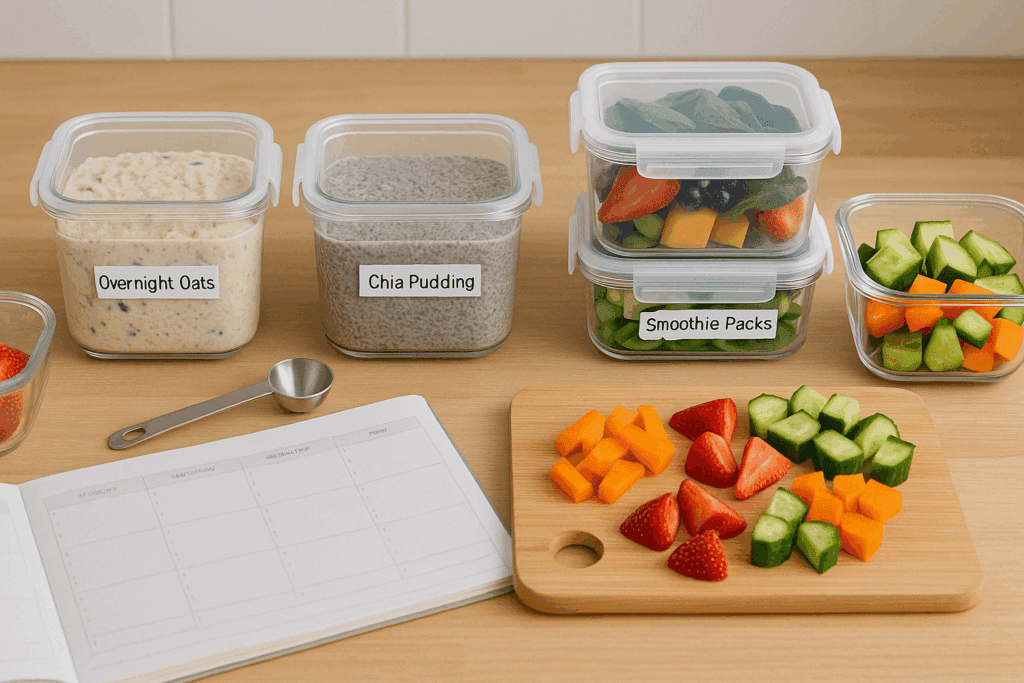
Healthy Breakfast Meal Prep Ideas for Weight Loss: Real-World Examples
To bring the theory into practice, consider these science-backed breakfast ideas that align with both plant-based nutrition and weight-conscious goals. One example is overnight oats prepared with unsweetened almond milk, chia seeds, a scoop of plant-based protein powder, and fresh berries. This meal is rich in fiber, protein, and antioxidants, offering sustained energy with minimal prep time.
Another versatile option is a tofu scramble with mixed vegetables and nutritional yeast, served alongside roasted sweet potatoes or a slice of sprouted grain bread. This dish provides a complete protein profile and ample fiber, supporting digestive health and fullness. For those seeking a sweeter option, a baked oatmeal made with mashed banana, flaxseed, cinnamon, and walnuts delivers complex carbs and healthy fats in a satisfying, make-ahead format.
Smoothie packs are another prep-friendly solution. Blend spinach, frozen berries, ground flaxseed, and plant-based protein ahead of time and freeze in individual portions. In the morning, simply blend with water or a milk alternative. This nutrient-dense breakfast can be consumed on-the-go while delivering a spectrum of vitamins, minerals, and phytonutrients.
Even when following a low-carb or keto approach, there are creative, prep-ahead breakfasts available. Try making chia seed puddings with unsweetened coconut milk, cacao powder, and stevia for a satisfying, high-fat, low-carb meal. Or, prepare egg and avocado breakfast cups with spinach and herbs, which are easily reheated and rich in protein and micronutrients.
Navigating the Keto Diet vs Low Carb Diet Debate in Breakfast Planning
For health-conscious individuals exploring structured eating plans, the nuances of the keto diet vs low carb diet debate can shape breakfast choices significantly. While both strategies aim to reduce insulin spikes and promote fat metabolism, they diverge in terms of dietary flexibility and nutritional breadth. Low-carb diets tend to offer more leniency, making them potentially more adaptable to diverse breakfast preferences.
For example, a low-carb breakfast may include a quinoa porridge with flaxseed and almond butter—foods typically restricted on keto but rich in fiber and healthy fats. Conversely, keto meals may include higher levels of saturated fats, such as those found in animal-based products, which may raise concerns regarding cardiovascular health if not balanced properly.
It’s also important to consider the social and psychological dimensions of dietary patterns. A low-carb approach may provide room for cultural traditions and spontaneous eating occasions, enhancing long-term adherence. In contrast, individuals following keto diets may find themselves more socially limited, particularly when eating out or attending gatherings. This raises the question: is keto a good diet for long-term health, or does its rigidity compromise overall well-being?
When constructing breakfast meal prep ideas for weight loss, the best approach is often a personalized one that reflects your unique health status, preferences, and lifestyle. A registered dietitian or medical professional can help determine whether a low-carb, keto, or balanced plant-based plan is most appropriate for you.
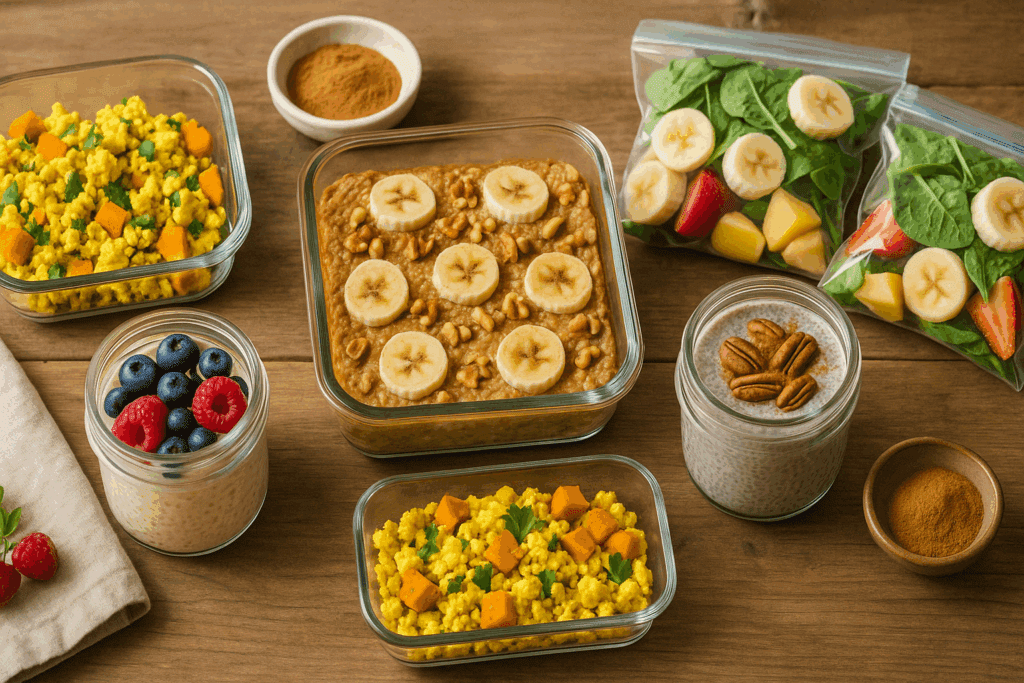
Sustainable Morning Nutrition: Is a Keto Diet Sustainable for Long-Term Health?
The question “is a keto diet sustainable” remains central in current dietary discourse. While short-term studies have shown promising results for rapid fat loss and improved insulin sensitivity, long-term data remains limited. Moreover, the restrictive nature of keto diets can result in micronutrient deficiencies, especially in B vitamins, magnesium, and fiber, unless meticulously managed.
From a psychological standpoint, the sustainability of any diet hinges on satisfaction, variety, and ease of adherence. Healthy breakfast meal prep ideas that feel indulgent, customizable, and satisfying are far more likely to be sustained than repetitive or highly restrictive routines. This insight is particularly important when designing low-carb or keto-inspired meals that must remain both enjoyable and nutrient-dense.
Whole-food, plant-forward approaches may offer a more sustainable alternative. For instance, emphasizing non-starchy vegetables, legumes, and healthy fats like tahini or nut butters can create low-glycemic breakfasts without inducing ketosis. This hybrid model respects the principles of carb moderation while offering a more balanced nutritional profile.
Moreover, for those asking “is keto no carbs,” it’s important to clarify that even strict keto diets often include trace carbs from vegetables, nuts, and dairy. Zero-carb living is neither realistic nor necessary for weight loss or health. The key is strategic carb selection—choosing high-fiber, nutrient-rich options that nourish the body and regulate appetite.
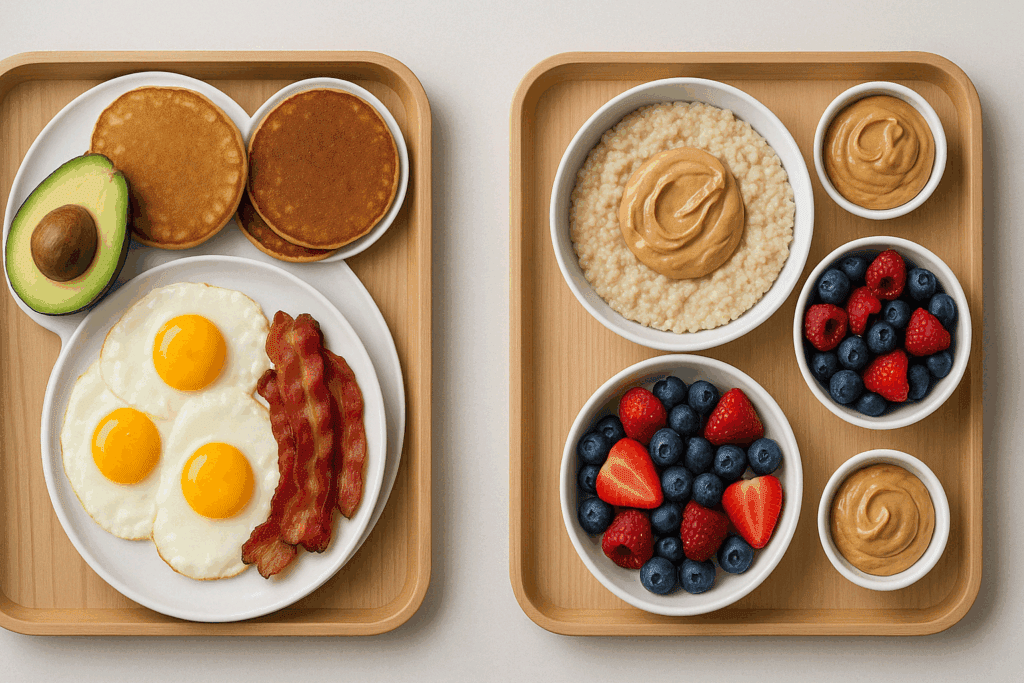
Frequently Asked Questions: Healthy Breakfast Meal Prep Ideas That Support Weight Loss
1. How can I customize healthy breakfast meal prep ideas to fit dietary restrictions like gluten intolerance or dairy sensitivity?
Adapting healthy breakfast meal prep ideas for specific dietary restrictions is entirely achievable andoften leads to creative, nutrient-rich alternatives. For those avoiding gluten, ingredients like certified gluten-free oats, almond flour, quinoa flakes, or buckwheat groats provide a safe and wholesome base for breakfast recipes. Dairy-free eaters can easily substitute plant-based yogurts, nut milks, or coconut cream in overnight oats and smoothie bowls. These alternatives not only accommodate sensitivities but also align with breakfast meal prep ideas for weight loss by incorporating lighter, fiber-rich ingredients. Furthermore, prepping your own meals ensures full control over what goes in, making it easier to avoid cross-contamination and inflammatory triggers.
2. What are some ways to maintain motivation and consistency with breakfast meal prep?
Staying motivated with healthy breakfast meal prep ideas often requires linking your routine to abroader sense of purpose or progress. One effective method is habit-stacking: pairing meal prep with an established morning ritual like journaling, stretching, or brewing coffee. Another strategy is visual tracking—documenting your meals or progress photos in a digital journal or wellness app. Adding variety is essential, as rotating different breakfast meal prep ideas for weight loss keeps your palate engaged and helps prevent burnout. Finally, involving family or friends in the process can turn routine prep into a shared wellness experience, reinforcing long-term consistency.
3. Are there cultural or international breakfast meal prep ideas that support weight loss?
Absolutely. Exploring international cuisine can add diversity and nutrition to your breakfast routinewhile supporting weight loss goals. For example, Japanese breakfasts often include miso soup, steamed vegetables, and fermented soy like natto—all rich in probiotics and fiber. Indian-inspired meal prep might feature spiced lentil pancakes (moong dal chilla) or vegetable upma, both offering plant-based proteins and resistant starches. These globally inspired healthy breakfast meal prep ideas not only offer fresh flavors but also bring metabolic benefits through antioxidant-rich herbs and spices. Diversifying your prep this way can increase adherence while expanding your nutritional intake.
4. How do circadian rhythms affect the timing and impact of breakfast on weight loss?
Emerging research in chrononutrition suggests that aligning meal timing with circadian rhythms canenhance metabolic outcomes. Eating breakfast earlier in the day—ideally within one to two hours of waking—may help regulate insulin sensitivity, reduce cortisol spikes, and optimize fat metabolism. This timing enhances the effectiveness of breakfast meal prep ideas for weight loss by syncing nourishment with the body’s natural energy demands. Conversely, delaying breakfast past mid-morning may lead to dysregulated appetite hormones and increased caloric intake later in the day. Planning your meal prep to support circadian cues can thus amplify both satiety and weight management outcomes.
5. How can busy professionals streamline breakfast meal prep during demanding workweeks?
Time-starved professionals can benefit from batch-prepping breakfast elements during low-stresswindows, like Sunday evenings. For example, pre-cooking grains, portioning smoothie ingredients into freezer bags, and storing toppings separately helps streamline morning assembly. Investing in stackable, labeled containers also simplifies daily grab-and-go routines. Rotating two or three foundational recipes ensures efficiency while still allowing flexibility. Integrating breakfast meal prep ideas for weight loss that require minimal to no reheating—such as chia seed pudding, almond butter energy balls, or yogurt parfaits—ensures portability without sacrificing nutritional value.
6. What role do anti-inflammatory foods play in breakfast meal prep for weight loss?
Incorporating anti-inflammatory ingredients can enhance the long-term efficacy of healthy breakfastmeal prep ideas by supporting cellular repair and hormonal balance. Berries, turmeric, ginger, flaxseeds, and leafy greens are all inflammation-fighting ingredients that work well in smoothies, oatmeal, or scrambles. These foods not only aid recovery from exercise but also reduce bloating and support digestive health—factors that indirectly support sustainable weight loss. For individuals managing chronic conditions like insulin resistance or PCOS, such ingredients may offer targeted benefits when consistently consumed at breakfast. Including these elements in breakfast meal prep ideas for weight loss elevates the meal from simply calorie-controlled to metabolically supportive.
7. Can intermittent fasting be integrated with breakfast meal prep strategies?
Yes, intermittent fasting and breakfast meal prep are not mutually exclusive—it simply requiresadjusting the timing of your first meal. For those following a 16:8 fasting window, breakfast may shift to a late-morning brunch that still reflects healthy breakfast meal prep ideas in structure and composition. Meal prep can support this approach by offering nutrient-dense, break-fast meals that emphasize protein and fiber to stabilize energy levels after a prolonged fast. Prepping in advance helps avoid reactive food choices when the fast ends. It also ensures that your post-fast meal aligns with weight loss objectives rather than compromising them through impulsive or low-quality options.
8. What psychological benefits are associated with consistent breakfast meal prepping?
Engaging in regular breakfast meal prep offers more than just physical benefits—it contributes to asense of control, routine, and self-efficacy. Creating and following through on healthy breakfast meal prep ideas can reinforce positive self-image and reduce decision fatigue, especially in high-stress environments. The act of preparing nourishing food for yourself can be a form of self-care that promotes mental clarity and emotional regulation. Over time, this consistency may enhance motivation in other wellness domains, such as exercise or mindfulness. For individuals pursuing weight loss, the predictability of breakfast routines may also help reduce stress-related eating and impulsive morning snacking.
9. How do gut-friendly ingredients in breakfast support long-term weight regulation?
Ingredients that nourish the gut microbiome, such as prebiotic fibers and fermented foods, play acritical role in weight regulation and inflammation control. Including gut-friendly items like kefir, psyllium husk, inulin-rich bananas, or oats in your breakfast meal prep ideas for weight loss can foster microbial diversity and short-chain fatty acid production. These metabolic byproducts help modulate fat storage and appetite control. Moreover, a healthy microbiome may improve emotional regulation, which influences dietary choices and consistency. Incorporating these ingredients regularly into breakfast can thus support both physiological and psychological drivers of sustainable weight management.
10. What are emerging trends or innovations in breakfast meal prep for health-conscious eaters?
Several trends are shaping the future of healthy breakfast meal prep ideas. Functional food powdersthat blend adaptogens, protein, and prebiotics are now being used in smoothie bowls or energy bites to enhance performance and recovery. Smart kitchen appliances, like overnight oat cookers or auto-blenders with programmable timers, are streamlining prep further. There’s also growing interest in zero-waste prep methods—reusing citrus peels in infusions or baking with leftover almond pulp from homemade milk. In the realm of breakfast meal prep ideas for weight loss, personalized nutrition apps are helping individuals design meals tailored to their metabolic profiles and goals. These innovations make it increasingly accessible to build effective, sustainable morning routines that align with both health and environmental consciousness.
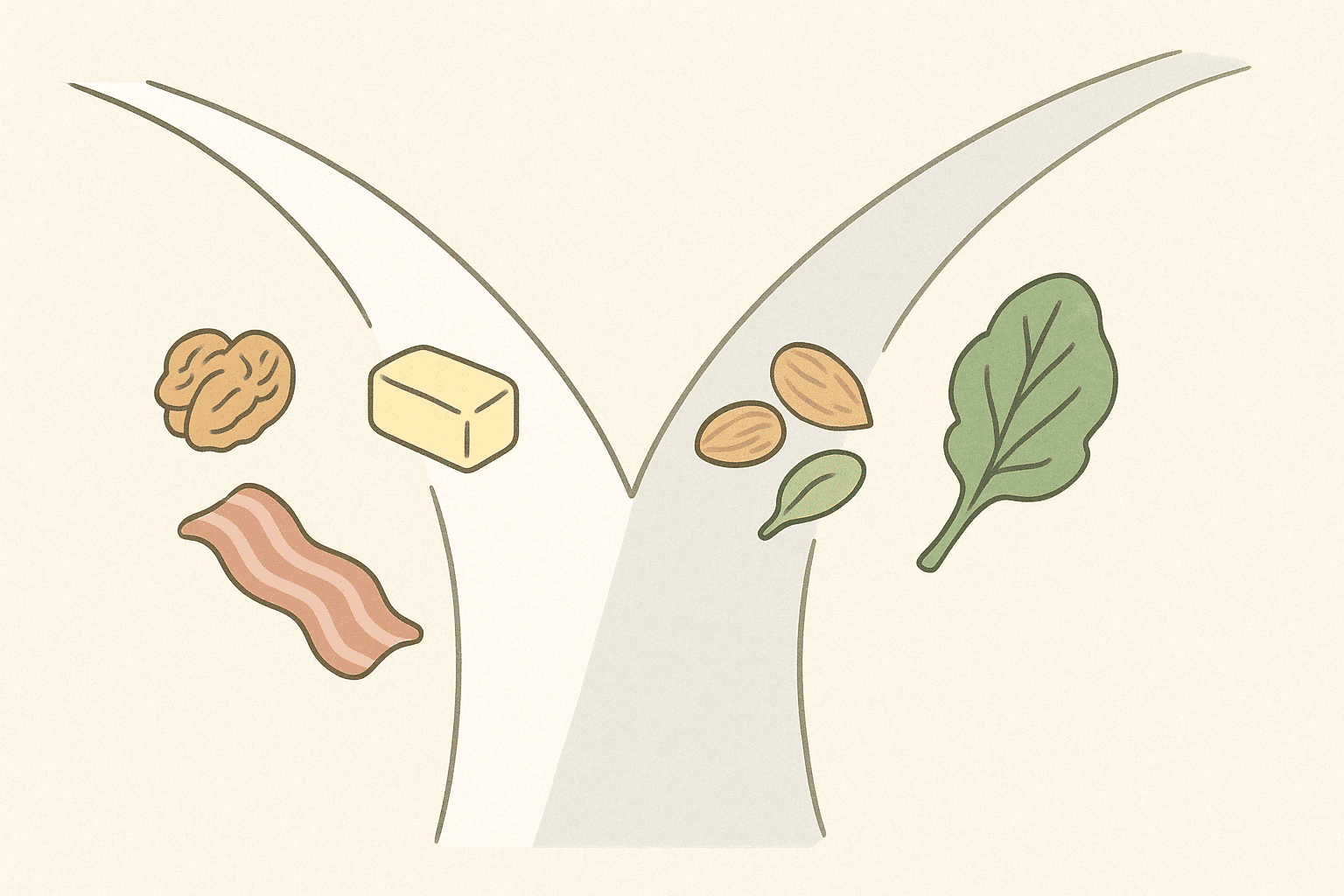
Final Thoughts on Choosing the Right Breakfast Prep for Your Lifestyle
Ultimately, the best breakfast strategy is the one that you can sustain—nutritionally, emotionally, and socially. Whether you gravitate toward healthy breakfast meal prep ideas grounded in plant-based nutrition or experiment with lower-carb approaches, the foundation should always be whole foods, science-backed principles, and personalization. Weight loss is not a one-size-fits-all journey, and breakfast is no exception.
From overnight oats and tofu scrambles to keto-friendly chia puddings and smoothie packs, breakfast meal prep ideas for weight loss can be as varied as they are delicious. By embracing balance, planning ahead, and understanding the nuances between dietary patterns like keto and low-carb, you empower yourself to make informed choices that support your goals and fit seamlessly into your life.
Whether you’re questioning “is keto a low carb diet,” evaluating the ketogenic diet vs low carb options, or simply seeking better ways to fuel your morning, the answers lie in mindful preparation, scientific insight, and a deep commitment to nourishment over restriction. That’s the kind of breakfast worth waking up for.
Was this article helpful? Don’t let it stop with you. Share it right now with someone who needs to see it—whether it’s a friend, a colleague, or your whole network. And if staying ahead on this topic matters to you, subscribe to this publication for the most up-to-date information. You’ll get the latest insights delivered straight to you—no searching, no missing out.
Further Reading:
10 Healthy Breakfast Recipes for Busy Mornings: Quick and Nutritious Ideas
14 Healthy Breakfast Foods That Help You Lose Weight
32 Healthy Breakfast Recipes with Foods to Help You Lose Weight

